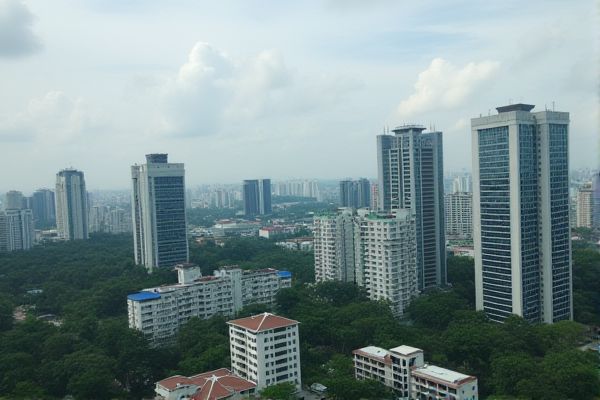
Safety and crime rates in Malaysia: Understand local crime hotspots. Stay informed about ongoing incidents. Use reliable transportation options. Keep belongings secure in public areas. Be cautious with nightlife activities. Monitor travel advisories regularly. Familiarize with local emergency numbers. Choose secure accommodation. Engage with expatriate communities. Follow local laws and regulations.
Understand local crime hotspots.
This study identifies crime hotspots in Malaysia, particularly in the Northeast Penang Island District and Kuching District, highlighting areas such as Jelutong Police Station and Ayer Itam Police Station in Penang, and Santubong Police Station and Gita Police Station in Kuching. The report focuses on areas with high z-scores and significant p-values, indicating concentrated burglary cases. For more detailed insights, the study can be accessed at Planning Malaysia, which offers a comprehensive analysis of regional crime patterns and statistics. This information is vital for developing strategies to enhance community safety and crime prevention in these districts.
Stay informed about ongoing incidents.
To stay informed about ongoing incidents in Malaysia, it is crucial to monitor the declining trends in national index and property crime rates, with a notable decrease in property crimes and violent crimes between 2010 and 2017, particularly in states like Kuala Lumpur and Selangor which report the highest crime frequencies. For up-to-date information, the Malaysia Security and Crime Index shows that the crime index ratio per 100,000 people improved from 273.8 in 2018 to 256.6 in 2019, with most states experiencing a decrease in crime index ratios, except for a few like Pulau Pinang, Sarawak, and Terengganu.
Use reliable transportation options.
To ensure safety in Malaysia, it is advisable to use reliable transportation options such as legit cab operators' apps, public buses, and trains. It is important to be cautious of unregistered taxi drivers and potential petty crimes like pickpocketing and overcharging. For more detailed information on safety measures, you can visit the Safety In Malaysia page.
Keep belongings secure in public areas.
To keep your belongings secure in public areas in Malaysia, it is essential to be cautious of pickpockets in crowded places like trains, buses, and subways, and never leave your belongings unattended. Additionally, being aware of muggers on motorcycles who may smash windows and snatch belongings during traffic is crucial. Utilizing reputable taxi services is recommended to avoid overcharging and other safety risks. For more detailed information on how to stay safe while traveling in Malaysia, you can visit the Holidify website.
Be cautious with nightlife activities.
When engaging in nightlife activities in Malaysia, it is crucial to be cautious, especially for women, by carrying your own drink at all times, avoiding drinks from strangers, and ensuring you have reliable friends or a trustworthy companion to look after you and escort you home. For more detailed guidance on staying safe in Malaysia, you can refer to the comprehensive advice provided by The Broke Backpacker, which offers insights into ensuring a secure and enjoyable experience for travelers.
Monitor travel advisories regularly.
Exercise a high degree of caution in Malaysia due to the threat of criminality and terrorism, particularly avoiding non-essential travel to the east coast of Sabah. Travel advisories are regularly updated to reflect the current security situation, and it is advisable to monitor these Travel Advisories for the latest information.
Familiarize with local emergency numbers.
In Malaysia, the central emergency number is 999, which connects callers to various emergency services including Police, Fire, Medical, Civil Defense, and Maritime Emergency Services, with calls answered promptly by professional emergency officers. Misusing this number can result in a fine of RM50,000 or a one-year prison sentence, or both. For more information, you can visit the Malaysia Emergency Number site.
Choose secure accommodation.
In Malaysia, secure accommodation is ensured through strict access control, including exclusive access cards for residents and CCTV surveillance in student dorms and hostels. This level of security makes apartments and condominiums safe with controlled entrances and monitored facilities. For more information on this topic, you can visit the Your Uni Blog which highlights the various measures in place that contribute to the safety of international students.
Engage with expatriate communities.
Malaysia is considered relatively safe for expatriates, positioning as the 19th safest country in the world in 2024, with low and decreasing crime rates. Although urban areas like Kuala Lumpur may have slightly higher crime rates than rural areas, it remains a secure destination for expats. By taking basic precautions, such as avoiding petty crimes like pickpocketing and bag-snatching, especially in crowded areas and tourist hotspots, expats can enjoy a safe living experience. For further insights and guidance, you can refer to the comprehensive Expat Guide on Moving and Living in Malaysia. By staying vigilant, expats can ensure a seamless and safe integration into Malaysian life.
Follow local laws and regulations.
To ensure safety in Malaysia, it is crucial to follow local laws and regulations, including strict prohibitions on drugs, avoiding bribery, adhering to traffic rules, and respecting local customs and religious laws, especially in states where Sharia Law is more dominant. Failure to comply can result in severe penalties, fines, or even prohibition from entering the country again. For more detailed information on these regulations, it's advisable to check the Important Laws and Legal Information for Travelers website to stay informed and travel responsibly.
